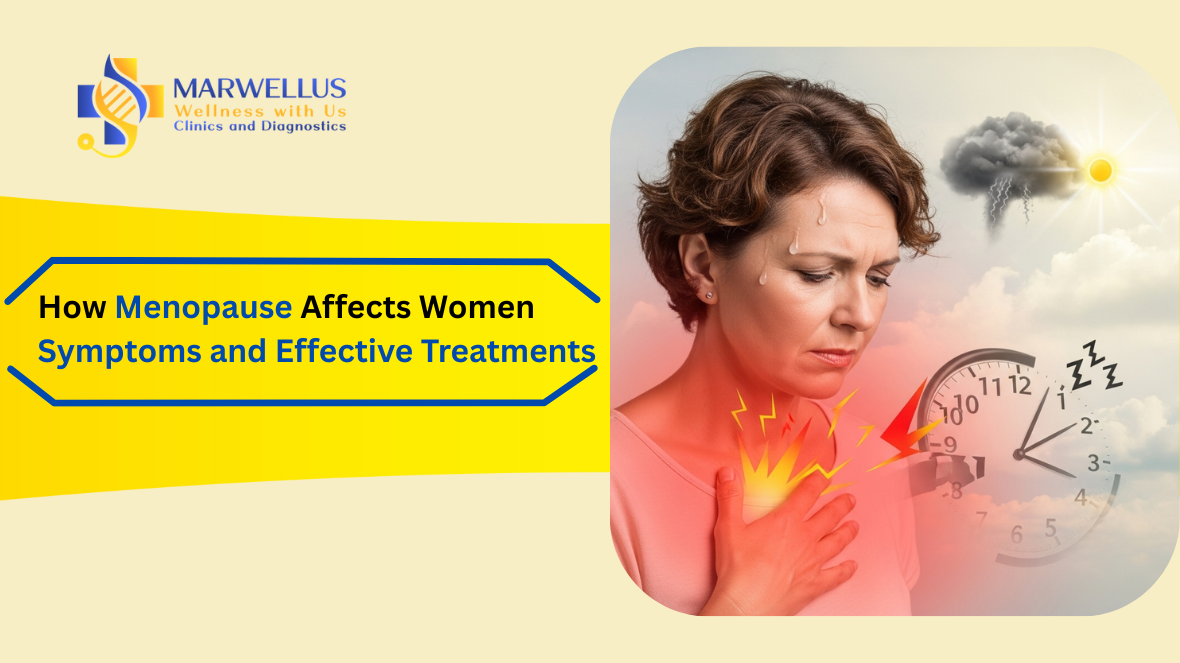Menopause is a natural stage in every woman's life, generally occurring from the age of 45 to 55, marking the end of menstruation. This transition brings a range of physical and emotional changes that affect overall well-being. Understanding menopause and its symptoms is key to managing this important phase of life.
This blog explores the common symptoms, effective treatments, and ways to maintain wellness during and after menopause.
Common Symptoms of Menopause
As women approach menopause, they may experience a variety of symptoms. These include:
- Hot Flashes and Night Sweats: These sudden waves of heat, often accompanied by sweating and chills, are the most well-known symptoms of menopause. They typically occur during the day (hot flashes) and at night (night sweats).
- Hormonal Fluctuations: Diminishing oestrogen levels can lead to changes in menstrual cycles, making them irregular before periods completely stop. This fluctuation can cause physical symptoms like bloating and headaches.
- Mood Changes: Hormonal changes can affect mood, leading to irritability, anxiety, or even depression. Emotional instability is common during this time.
- Sleep Disturbances: Many women report difficulties sleeping, especially due to night sweats, which interfere with rest.
- Vaginal Dryness: Decreased oestrogen can lead to vaginal dryness, which can make sexual activity uncomfortable.
- Long-Term Health Concerns: After menopause, women may face an increased risk of osteoporosis, when their bones become fragile, and cardiovascular disease, due to the reduction in estrogen, which has a protective effect on the heart.
Understanding the Menopausal Transition
Menopause is not an abrupt event; it is a gradual process that happens in several stages:
- Perimenopause: This is the transitional period leading to menopause, which can start in a woman's 40s or even earlier. During perimenopause, hormonal fluctuations occur, and women experience the early symptoms of menopause, including irregular periods and hot flashes.
- Menopause: A woman is considered to have reached menopause when she has gone without a period for 12 consecutive months. This marks the end of the reproductive phase of life.
- Postmenopause: The years following menopause are called postmenopause. Many of the menopause symptoms, such as hot flashes, may subside, but women may still face long-term health challenges like bone thinning and heart disease.
For a deeper understanding of menopause and expert guidance on navigating its challenges, you can explore our blog, A Gynaecologist's Guide to Navigating Menopause.
Effective Treatments for Menopause Symptoms
There are several methods for managing menopause symptoms, each with its own benefits and considerations:
- Hormone Replacement Therapy (HRT): This treatment involves taking estrogen and, in some cases, progesterone to relieve symptoms like hot flashes, vaginal dryness, and mood changes. While effective, HRT is not suited for everyone due to potential risks like blood clots, stroke, or breast cancer.
- Non-Hormonal Treatments: Many women opt for lifestyle changes, herbal remedies, and over-the-counter solutions to manage their symptoms. This may include:
- Eating a balanced diet that is rich in calcium and vitamin D supports bone health.
- Regular physical exercise can reduce hot flashes and improve mood.
- Herbal supplements, such as black cohosh, should be used with caution and under a doctor’s guidance.
- Mental Health Support: Since menopause can affect mental health, managing stress and seeking mental health support is crucial. Cognitive behavioural therapy (CBT) or antidepressants may be helpful for some women dealing with depression or anxiety.
Maintaining Wellness After Menopause
After menopause, maintaining a healthy lifestyle is essential to avoid long-term health complications:
- Exercise: Routine physical activity helps manage weight, improve mood, and strengthen bones. Weight-bearing exercises, like walking or strength training, are especially important to prevent osteoporosis.
- Balanced Diet: A diet rich in whole grains, fruits, vegetables, lean proteins, and healthy fats supports overall health. Eating foods that help with hormonal balance, like flaxseeds and soy, may also be beneficial.
- Preventive Care: Routine check-ups with your doctor are crucial for managing the risks of osteoporosis, heart disease, and other postmenopausal health concerns. Regular screening tests, such as mammograms and bone density tests, are also recommended.
Final Thoughts
Addressing the symptoms of menopause and seeking appropriate treatment can greatly improve quality of life during this transitional phase. A holistic approach encompassing lifestyle changes, medical treatments, and mental health support ensures women can navigate menopause with greater ease. It is important to consult with a healthcare provider to create a personalised plan that supports health and well-being during and after menopause.
Take Action Today! Expert Menopause Care is Just an Appointment Away
Experiencing menopause symptoms? Book an appointment today at Marwellus Clinic & Diagnostic Centre to receive personalised care and guidance on managing your symptoms effectively. Our experienced team will work closely with you to provide tailored treatment options, including hormonal and non-hormonal therapies, lifestyle modifications, and mental health support.
Frequently Asked Questions
What are the common symptoms of menopause?
Hot flashes, night sweats, mood swings, sleep disturbances, and vaginal dryness are some of the most common symptoms.
How do I know if I am in perimenopause or menopause?
Perimenopause is the transitional phase before menopause, marked by irregular periods and symptoms like hot flashes. Menopause is confirmed when a woman has gone without a period for 12 consecutive months.
What treatments are available for menopause symptoms?
Treatments for menopause symptoms include Hormone Replacement Therapy (HRT), non-hormonal therapies like lifestyle changes and herbal remedies, and mental health support for emotional symptoms.
How can I manage menopause symptoms naturally?
To manage menopause symptoms naturally, focus on a balanced diet, regular exercise, staying hydrated, and reducing stress through relaxation techniques or mindfulness practices.
Is menopause linked to long-term health risks?
Yes, menopause can increase the risk of osteoporosis, heart disease, and other health conditions, making it essential to maintain a healthy lifestyle and have regular health check-ups.



